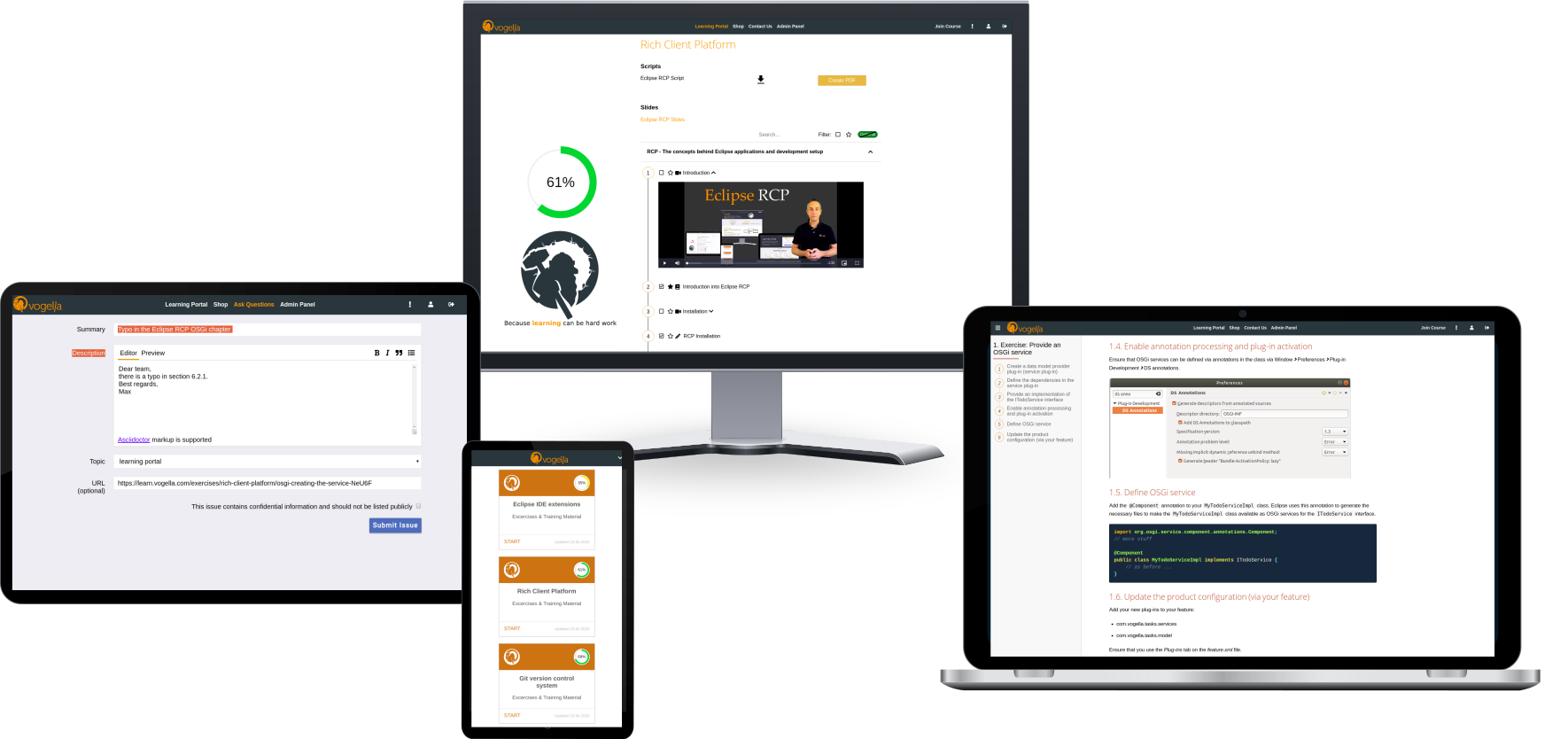Eclipse Plug-in Development Training
The vogella GmbH company actively supports the Eclipse framework.
Our employees are leaders of the Eclipse project, and are actively
involved in the latest developments.
Take advantage of this expertise and get this online training.
- Topic: Eclipse IDE extensions
- Language: English
- Fee first year: €460.00 excl. VAT
- Each following year: €110.00 excl. VAT
-
Content:
-
Features:
- >600 pages of script
- 4 instructional videos
- 149 hands-on exercises
- continuous updates
- one year access
- reduced price all following years
Why this training?
Overview
- Watch explanation and coding videos recorded by our experts
- Get access to comprehensive and coordinated exercises
- Report problems with the exercises and our experts will help you to solve them as soon as possible
- Learn to develop Eclipse Plug-ins professionally while using the latest API's
- Get access to an extensive script with more than 700 pages, which covers every aspect of Eclipse Plug-in programming
- Continuous updates of the training material are always available
- Strengthen and deepen your knowledge through the development of a comprehensive training example
- Compared to the vogella.com tutorials the training is guided, you find more material, you get access to videos and you can ask questions regarding the material to the vogella employees

Which topics are covered?
Agenda
Introduction to Plug-in development
- Components of the Eclipse platform
- Important configuration files
Plug-in development and deployment
- Creating plug-ins
- Exporting plug-ins
- Using features
- Creating update sites
Using the application model
- The concept of the dynamic application model
- Accessing, updating and creating model elements
- Using model fragments and processors
Using the Eclipse dependency injection framework
- Introduction into dependency injection
- Using DI in Eclipse e4 components
- Using DI in Eclipse 3.x components
- Accessing the Eclipse context via singletons
Extending the IDE with views
- Contributing 3.x views
- Contributing e4 view
User interface programming with SWT and JFace
- Using SWT
- Using JFace
- Using Databinding
- Implementing wizards and dialogs
Declarative styling with CSS
- Introduction into CSS
- Definition of styles and themes, colors and gradients
- Styling specific widgets
- Dynamic style switching at runtime
- Using the CSS Spy tooling
Using commands
- Contributing commands and menus
- Using toolbars, view menus and popup menus
Platform services and interaction of components
- Service overview
- Part service
- Model service
- Selection service
- Command and Handler service
Modularity for Eclipse 4 applications
- Contributing to the application model
- Static model contributions with fragments
- Dynamic model contributions with processors
Internationalization (i18n)
- Adding support for multiple languages
- Usage of fragment projects
- Outlook: translation services in Eclipse 4
Concurrent UIs
- SWT threading
- Avoiding invalid thread access
- Asynchronous processing with the Eclipse API
Resources and markers
- Integration with the problems view
- Custom markers
Adapter pattern
- Implementing the adapter pattern
- Adaptable objects
- Using the Properties and Outline view
Implementing custom text editors
- Implementing a text editor
- Reusing the generic editor framework
- Providing syntax highlighting, hover, code complemetion and validation
Extending the Java development tools
- Abstract Syntax Tree vs Java Model
- Custom generators
- Custom quick fixes
- Custom templates
- Using the refactoring API